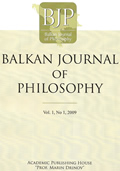On the Alleged Indispensability of Intuitions in Philosophy
On the Alleged Indispensability of Intuitions in Philosophy
Author(s): Marián ZouharSubject(s): Philosophy
Published by: Институт по философия и социология при БАН
Keywords: Argument against empiricism; evidence; George Bealer; intuition; philosophical knowledge; rigid designation.
Summary/Abstract: It is sometimes claimed that intuitions are an indispensable part of the evidential support provided for, or against, philosophical theses concerning a wide range of topics. This view is ingeniously argued for by George Bealer. His approach is based on a close connection between the modal nature of philosophy and the indispensability of intuitions as sources of modally-oriented evidence. This paper is aimed at a critical assessment of this approach. It is claimed that philosophy, though being modal at bottom, need not rely on (modal) intuitions as sources of evidence. In particular, it is shown (i) that at least some of Bealer’s crucial philosophical arguments do not rest on intuitions as evidence and (ii) that one may find modal philosophical claims of considerable importance that do not require modal intuitions for support. As a result, (modal) intuitions need not be considered indispensable for gaining philosophical knowledge, even when philosophy is understood along Bealer’s lines.
Journal: Balkan Journal of Philosophy
- Issue Year: VII/2015
- Issue No: 1
- Page Range: 37-44
- Page Count: 8
- Language: English

